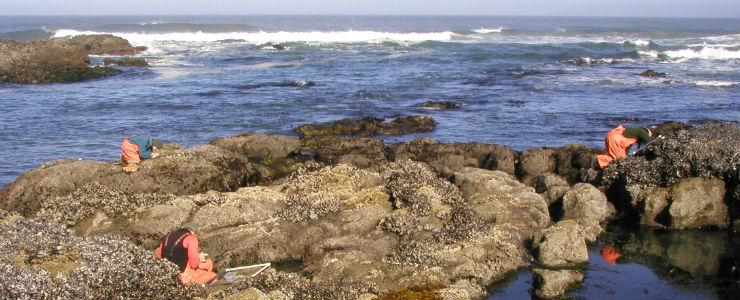Coastal Biology
The nearshore marine environment, the interface of land and sea, is one of the most biologically productive areas on Earth. It is also the place where most people interact with the ocean. This interaction occurs in may ways: urban discharge from towns and cities, agricultural runoff from farms and fields, commercial and recreational fishing, whale watching expeditions, and teachers leading field trips to the shoreline. Due in large part to increasing coastal concentrations of people and their cumulative impacts, there has been a growing interest as well as legislation focused on the conservation of coastal biological environments and living marine resources.
The Coastal Biology cluster group concentrates their effort on the coastal ocean, including the animals and plants that populate the different environments and habitats of this zone, as well as the processes that influence the distribution of these organisms and how all of these change spatially and temporally. The methods used by the scientists in this group are as varied as the organisms they study. By using innovative field approaches and molecular tools, these coastal biologists and ecologists explore questions of population biology and genetics, reproduction and dispersal, community structure, evolutionary biology, and ecosystem health and change.
Faculty (Professors and Adjuncts) and Professional Researchers affiliated with the Coastal Biology Cluster Group:
Suzanne Alonzo, Professor of Ecology & Evolutionary Biology: Sexual selection, social behavior and the evolution and ecology of reproduction.
Giacomo Bernardi, Professor of Ecology & Evolutionary Biology: Fish biology, phylogenetics, evolution.
Mark Carr, Professor of Ecology & Evolutionary Biology: Marine ecology, applied marine ecology.
Phillip Crews, Distinguished Professor Emeritus of Chemistry & Biochemistry, Research Professor: Marine natural products chemistry, bioorganic chemistry, organic structural analysis by NMR, natural products of marine macro- and microorganisms.
Laurel Fox, Professor of Ecology & Evolutionary Biology: Terrestrial population and community ecology, plant-animal interactions.
Kristy Kroeker, Professor of Ecology & Evolutionary Biology: Global change biology, community ecology, applied marine ecology.
Marc Mangel, Professor Emeritus SOE, Distinguished Research Professor: Mathematical modeling of biological phenomena, especially quantitative issues in fishery management; mathematical and computational aspects of aging and disease; impact of technology on biological systems.
Ingrid Parker, Professor of Ecology & Evolutionary Biology: Plant ecology, plant-pathogen interactions, biological invasions .
Grant Pogson, Professor Emeritus of Ecology & Evolutionary Biology: Molecular population genetics, ecological genetics, marine invertebrates and fishes.
Donald Potts, Professor of Ecology & Evolutionary Biology: Coral reef ecology, genetics, evolution, and geological history; marine biodiversity; tropical biology, global change, and remote sensing.
Peter Raimondi, Professor of Ecology & Evolutionary Biology: Marine ecology, evolutionary ecology, experimental design, applied ecology.

